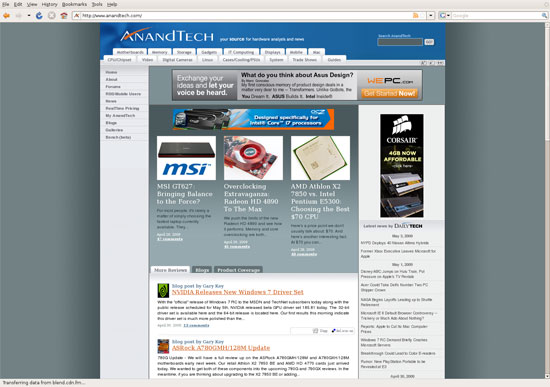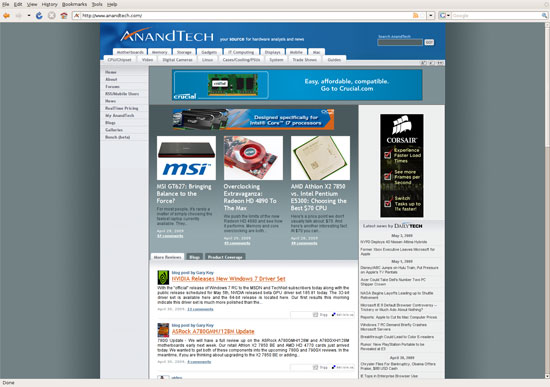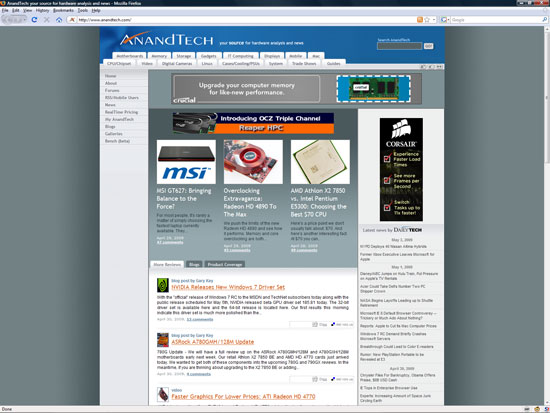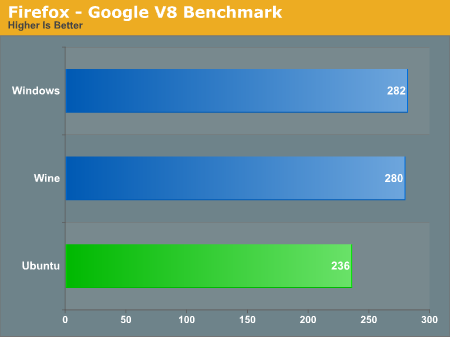Revisiting Linux Part 1: A Look at Ubuntu 8.04
by Ryan Smith on August 26, 2009 12:00 AM EST- Posted in
- Linux
Applications: Web Browsing
Windows Default: Internet Explorer 7
What I use: Firefox 3
Ubuntu Default: Firefox 3
Much to the chagrin of Microsoft, the web browser is turning in to a miniature OS of its own, and in the case of anything that’s not Internet Explorer, it’s a miniature OS that has no allegiance to a real operating system. It’s the primary way to retrieve most information from the internet, applications can be created through AJAX and Flash, video can be watched (see: Hulu). A good cross-platform web browser removes a great deal of the need to use any specific OS, and this is something that works in Ubuntu’s favor.
Ubuntu ships with Firefox 3, Internet Explorer’s loyal opposition and currently the #2 browser on the market. So long as a site isn’t built for IE6 Firefox has great compatibility, good speed, and an army of extensions to add features to it. Since many of you already use it, there’s not a lot to say here: it’s a very solid browser, and something I find to be superior to Internet Explorer.

As I already use Firefox under Windows, the transition here was virtually non-existent. Ubuntu doesn’t have any direct Windows to Ubuntu transition tools, but after moving my Firefox profile from Windows to Ubuntu and reconfiguring a few location-sensitive settings, I was up and going. Internet Explorer users are going to have more of a transition obviously, but it’s not much. All of the major browsers’ core behaviors are the same, which makes it easy to switch among them with little fuss.
At the risk of marginalizing the rest of Ubuntu, I consider Firefox to be one of the core components that makes Ubuntu a success story. Because so much computer use these days is inside a browser, it has become a lynchpin for a good OS. If your browser is bad, then it’s probably hurting the usability of your OS if it means that many users cannot do something they regularly do on another browser. One only needs to look at the early versions of Mac OS X to get a good picture of this, as it shipped with the only-bearable Internet Explorer 5.
There are however a few caveats that I’d like to hit on. Something that continues to throw me for a loop is that while it’s the same Firefox I use under Windows and Mac OS X, it doesn’t necessarily look the same. The rendering engine is the same, but OS differences start to play out here. Mac OS X, Windows, and Ubuntu all render text slightly differently, and in the case of Ubuntu come with a significantly different font set. Because Firefox is at the mercy of the OS for fonts, what you get are small but noticeable differences in how the same page looks.

Firefox with default fonts

Firefox with MS Core fonts

Firefox under Windows
Above we have AnandTech rendered in Firefox 3 on Windows, and Ubuntu. On Windows Firefox uses Times New Roman and Arial for its default fonts, but these fonts do not exist on Ubuntu; rather Ubuntu uses what’s called “serif” and “sans-serif”. This along with how the two OSs differ in font anti-aliasing results in the different look of Firefox under Ubuntu. Having used Windows for a number of years, I have never gotten past the idea of Ubuntu looking “wrong” even though the right look is entirely subjective.
Ultimately I ended up adding the missing fonts by installing the msttcorefonts package, which contains Times New Roman, Arial, and the other “big name” standard fonts. With those installed and Firefox configured to use them, text looks much closer, although not quite the same. It’s a shame that Ubuntu can’t include these fonts by default.
The second caveat is one of performance. When using Javascript-heavy sites in particular, Firefox on Ubuntu seems just a bit slower than under Windows. I had never been able to figure out why until I saw this Slashdot article. Firefox for Linux is not compiled with profile guided optimization, a method of improving the performance of binaries by looking at how they’re used. While Ubuntu compiles their own releases of Firefox, they do the same thing. As a result, there’s a speed difference in Firefox – it’s the same code, but the Windows version is compiled in such a way that it’s faster. As I wrote at the start of this article, I’m not concerned with the performance of Ubuntu or its applications for the most part, and this falls under that notion. Firefox is slower, but not to the point that I care. It’s interesting enough that it bears mentioning, however.
Just to give you an idea of what the speed difference is, here’s a breakout of one of our Firefox benchmarks from the benchmarking section later in this article:

As you can see, in this Javascript-heavy test Firefox on Ubuntu is upwards of 17% slower than it is under Windows. As this performance gap manifests itself largely under Javascript-heavy situations; regular browsing doesn’t show nearly the difference. Flash is also slower, but this has nothing to do with Firefox and more to do with Flash’s mediocre performance under any OS that isn’t Windows.
The last caveat is one of how Ubuntu’s distribution model becomes strained when it comes to Firefox. Ubuntu Hardy shipped nearly 2 months before Firefox 3 did. But because Ubuntu is meant to be a stable platform they still needed to package Firefox 3 with the OS, so Firefox 3 Beta 5 was included. If we had done this article a month after Hardy launched as intended, I’d have few nice things to say. Firefox 3 Beta 5 combined with Adobe Flash 9 was buggy, unstable junk. Canonical made the right decision as the final version of Firefox 3 turned out well, but it highlights the pitfalls of including 3rd party software with the OS.
The flip side of this caveat is that Firefox 3.5.x has superseded 3.0.x as the newest Firefox branch, which means that only 3.0.x versions are being pushed out to Hardy. This means if you want to take advantage of any of Firefox’s newest features such as the new javascript engine, you’ll need to install a 3.5.x build separately, ideally through a PPA package so that it cleanly replaces the default version of Firefox.
But even with those caveats, none of them are serious issues. Firefox 3 is still a fantastic browser and there’s nothing else I’d rather have on Ubuntu.
Final Verdict: Meets My Needs










195 Comments
View All Comments
Guspaz - Wednesday, August 26, 2009 - link
"Not that it would necessarily be of much use, the last time I saw any statistics for instant messaging network usage, the vast majority of North American users were on AOL’s AIM network."IM use is highly regionalized. As such, AIM is clearly the dominant IM in the USA. However, Canada is dominated by MSN Messenger, and has been for many years (most of us migrated from ICQ to MSN around the release of Windows XP, I believe, due to the bundling of then Windows Messenger).
So, if Canada is dominated by MSN, while I can't speak for Mexico, it's misleading to claim that "the vast majority of North American users". As a Canadian, I can't think of anybody I know in person that uses AIM. They all use MSN or Google Talk without exception.
Aclough - Wednesday, August 26, 2009 - link
For myself, the thing that most bugs me when I have to go back to Windows is all the missing features from the window manager. I've come to rely on having multiple workspaces on my desktop, but I can adjust to having just one fairly easily when I'm not working on a lot of different stuff at once. What really bugs me, though, is how much more effort it takes to move or resize windows in Windows. On Linux I can press ALT and then click anywhere on the window, but with Windows I have to carefully click the title bar or the very edge of the window and that takes a noticeably longer time once you're used to doing things differently.Oh, and I find that the Linux scheduler seems to be noticeably better than the Windows one in preserving responsiveness when the system is under load.
fumacapena - Wednesday, August 26, 2009 - link
Great article!How about some benchmarks of "minimal" distros (like Puppy, Tine Core, ...)??
I like the idea of "ressurect" an old PC, but I would like to see benchmarks in Quad Cores, i7 too!
Anandtech is great, Bench(beta) is awesome!!
(sorry by bad english)
Thanks
InGraphite - Wednesday, August 26, 2009 - link
A few months ago most major trackers unbanned Transmission, but it still doesn't seem to be universally accepted on private trackers.I remember offhand (I could be wrong) that the main gripe was due to the fact it made excessive queries and thus flooded trackers with requests, or had the ability to.
chomlee - Wednesday, August 26, 2009 - link
I think you really need to mention the big picture here.I myself just tried Ubuntu for the first time 2 months ago and although I will admit that I have spent up to 8 hours trying to figure out how to install a specific program (before I found out there was a way to get the package manager to find the install), and I wanted to smash my computer at times. Now that I have learned quite a bit more, I realized that the few things I have installed worked great and flawlessly.
Anyhow back to the big picture. I can understand some of your concerns with how the OS will work with specific programs but what I have found is that most people I know use their computers for 2 things email and web browsing. Most of these people are constantly having problems with the system running too slow and cant seem to get rid of hidden viruses/malware. So I think that those people could easily be much happier with a simple OS like Ubuntu just for email and web browsing (And I would get a heck of alot of less calls from my dad asking my why his computer is running too slow). Lets also not forget that everything is moving to be browser compatible (like you mentioned).
Also, for people like myself, I use my Ubuntu system for a file server as well as a media center (XBMC is Awesome).
So, yes, for burning DVDs/CDs/Playing Games/Microsoft Office, I see no reason why you wouldn't use windows, but I think 95% of the users would be perfectly fine with ubuntu which is something that Mr Bill would not be very happy about when the public realizes this.
Keno - Thursday, August 27, 2009 - link
I think you have missed one small but important part.I am Ubuntu user since 8.04. I came to Linux because of the constant treat of viruses.
Last month I have installed 7 and it is very user friendly and I think it is very user frinedly but after Avira Antivir got crashed by virus I installed Kaspersky INternet security 2010. then it took almost twice as long to boot. Then I gladly returned to Ubuntu 9.04. Because MIcrosoft can not exist without Antivirus I think you should do some real benchmarking and test windows WITH Antivirus.
On Ubuntu I have ClamWin just in case i get some files from Windows users:)
Thanks
ioannis - Wednesday, August 26, 2009 - link
just wanted to point out that you can install software under the LiveCD. Of course it does not install on the hard drive. It remains on a ram-drive, so when you reboot, it's gone. It's still useful, if you wish to test out some package or perform some task with a tool not installed by default on the LiveCDstrikeback03 - Wednesday, August 26, 2009 - link
Even more useful (and not mentioned) is that Ubuntu can easily run off a flash drive, and more recent versions even include a GUI tool for installing it to one. Then all installs and other changes are saved from session to session, and everything runs much more quickly than the LiveCD.Mr Pearce - Wednesday, August 26, 2009 - link
It would be great if you could do more articles on compiler and especially driver performance differences. That was the most interesting part of this article.Ryan Smith - Wednesday, August 26, 2009 - link
This is what Part 2 will look at. I can compile some stuff by hand to see if it closes the Windows/Ubuntu gap, and I have plenty of video cards on hand to test what I can when it comes to graphics.